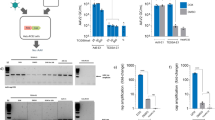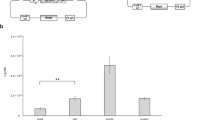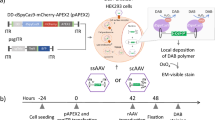Abstract
Adeno-associated virus 2 (AAV), a human parvovirus, has properties such as stable chromosomal integration, high infectivity and lack of known human pathogenicity, making it a potentially useful vector for human gene therapy. AAV requires a helper virus, such as an adenovirus, for optimal replication and packaging in mammalian cells. Although replication of the wild-type AAV genome has been demonstrated in vitro, packaging of infectious viral particles was not documented until now. In this study, we produced in vitro infectious recombinant AAV virions containing the neomycin resistance (NeoR) and the human CD-16 (FCγRIIIa) gene. Our in vitro packaging of AAV has the same characteristics as AAV produced in vivo and demonstrates the feasibility of developing a safe packaging method for AAV to be used in gene therapy.
This is a preview of subscription content, access via your institution
Access options
Subscribe to this journal
Receive 12 print issues and online access
$259.00 per year
only $21.58 per issue
Buy this article
- Purchase on Springer Link
- Instant access to full article PDF
Prices may be subject to local taxes which are calculated during checkout
Similar content being viewed by others
Author information
Authors and Affiliations
Rights and permissions
About this article
Cite this article
Ding, L., Lu, S. & Munshi, N. In vitro packaging of an infectious recombinant adeno-associated virus 2. Gene Ther 4, 1167–1172 (1997). https://doi.org/10.1038/sj.gt.3300514
Received:
Accepted:
Issue Date:
DOI: https://doi.org/10.1038/sj.gt.3300514
Keywords
This article is cited by
-
AAV vectors: is clinical success on the horizon?
Gene Therapy (2000)



